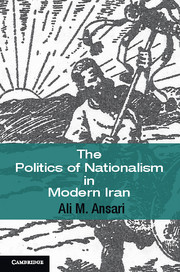2 - An Iranian Enlightenment
Published online by Cambridge University Press: 05 November 2012
Summary
..Cyrus founded the Iranian monarchy, Darius ordered Iranian politics, Ardeshir Papagan renewed the Iranian state, Zoroaster founded the ancient Iranian religion and Ferdowsi restored (revived) the Iranian nation.
ForoughiReal patriotism [nationalism] is built on the foundations of freedom and justice. Imposed nationalism cannot take root
TaqizadehIntroduction
At this stage it is worth reviewing the circumstances in which Iran’s philosophers of nationalism found themselves at the turn of the twentieth century, both materially and intellectually. The political reality has been well charted, and although contemporary historians may debate the details and extent of Iran’s decline in the late Qajar period, reformers and statesmen were in little doubt that a serious malaise had set in. This may not have approached the sense of terminal decline which populated some European assessments and which was to later serve to marginalise the Qajars within Pahlavi historiography, but there was nonetheless an increasing sense of urgency about the weakness of the state and the necessity for some remedy. Territorial losses and European economic encroachments combined with the crown’s seeming inability to do anything constructive, all served to create distance between the government and the reform-minded intellectual elite. In numerical terms this elite was small, but given that politics remained unequivocally the preserve of the few, numbers bore little immediate relation to effect and impact. What mattered was the reach of this elite, their penetration of relevant parts of society and the cohesion of any movement, along with crucially, the ability of the government to resist and/or to impose its will. In many ways the durability of the Qajar state was a function of the incoherence of its opposition, not its own ability to exercise the tools of administration and coercion – even if these had existed.
- Type
- Chapter
- Information
- The Politics of Nationalism in Modern Iran , pp. 36 - 109Publisher: Cambridge University PressPrint publication year: 2012



